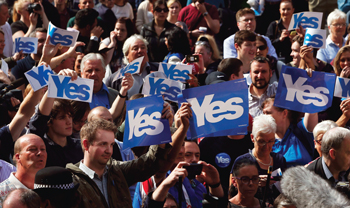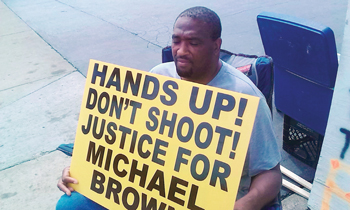Separation, independence and the future
By FinalCall.com News | Last updated: Sep 23, 2014 - 9:31:26 PMWhat's your opinion on this article?

Yes supporters in Glasgow, Scotland, as the campaign ahead of the Scottish independence referendum intensifi es, Sept. 11. The referendum on Scotland’s independence takes place on September 18. Photo: AP Wide World Photos
|
While Britain’s Prime Minister David Cameron hailed the vote 55 percent to 44 percent to stay with Britain, the question is not fully resolved. Scottish political leader Alex Salmond complained that voters were misled by British promises to give Scots more power and reneged quickly on those promises.
A break-up is inevitable, said Mr. Salmond, who led the “Yes” campaign for independence and was leader of the Scottish National Party. He resigned after the vote but said the struggle for independence will go on. The Brits promised Scotland more power over taxes and spending for welfare if they stayed with the United Kingdom. The Brits say the issues will be talked about in November and new laws will be drafted in January.
“Cameron might wish things were ‘settled,’ but they aren’t. The demand for independence isn’t going away. When you consider the apocalyptic predictions of the No campaign, the Yes campaign’s transparent dishonesty (on taxes and spending) and incoherence (on the currency), the threats of Scottish businesses to move south, and the rock-solid consensus outside Scotland that leaving the union would be a tragic error, 45 percent support for independence suggests a certain resilience,” wrote Clive Crook for bloombergview.com. The piece was titled “Scotland’s Vote Settles Nothing.”
“According to a poll taken alongside the referendum, 70 percent of those voting for independence thought ‘the principle that all decisions about Scotland should be taken in Scotland’ was the most important factor; only 20 percent said they gave most weight to ‘on balance, Scotland’s future looked brighter as an independent country.’ Compare that with the other side. Of those voting for the union, 47 percent said the risks of separation were the main reason to stay; only 27 percent said ‘a strong attachment to the U.K. and its shared history, culture and traditions’ counted most. It’s as you would expect, maybe, but nonetheless worth noting: Strength of conviction rests heavily on the independence side.
“The Scots already have their own parliament and a substantial measure of self-government. This new phase of devolution, like the previous one, will whet rather than sate the appetite for more,” he predicted.
So while Scotland has its own Parliament and a great amount of self-government, nearly half of those who turned out in a heavy election want to chart their own course. The Scots aren’t complaining about rights violations, police brutality and murder, cultural differences, historical oppression, disparity in income, lack of health care and opportunity, disrespect of their history, continued discrimination nor any pervasive anti-Scottish attitudes. They didn’t complain about over-incarceration of Scots or under-education of Scottish children.
The basic principle of self-determination fueled their desire to be able to self-govern. They didn’t complain about the inability to integrate into the United Kingdom, though they have the development and cultural connections to fully integrate.
They want to do something for themselves.

Protestor hold a sign against the shooting of unarmed Michael Brown, a Black 18-year-old, killed by a White police offi cer in Ferguson, Mo.
|
“It is the right time that we seek Separation and Independence for our nation from the evils of our open enemies, and not the foolish things other organizations are doing. They want our people integrated into our open enemies to be destroyed as a people,” writes the Honorable Elijah Muhammad in “Separation! Independence!” a chapter from Message to the Blackman in America, published in 1965.
“We, once slaves, have grown to be a nation of twenty million or more in a nation that enslaved our fathers and to this day has deprived us of equal justice under their own laws. No equal civil rights—most of us are treated by White citizens of America as animals. It is common to see and hear of White mobs attacking, beating, and shooting down poor Blacks whose fathers’ and mothers’ labor, sweat and blood helped make America the richest government on earth; nevertheless, we are yet the most hated and mistreated people.
“Allah (God) wants to make a great nation out of us (so-called Negroes). But if we desire to remain the slave of servants for our slave-masters, it is all right with Allah. Do we love ourselves and our children? If so, why not build a future for ourselves rather than beg the same slave-masters for jobs and equal shares in whatever they have—even to equal membership in their society and families (intermarriage).
“This is definitely not a wise thing to do, but a very foolish and destructive thing for the once slave and his master to do. By the help and guidance of Allah (God), I have put before you the wise and best thing for your future,” he wrote.
“There is no such thing as living in peace with White Americans. You and I have tried without success,” he noted. “Night and day they are out seeking a chance to beat and kill you, while at the same time you are out seeking to show them How Much You Love Them. A very foolish people you are. How can anyone, other than you (so-called Negroes) love an open enemy?” he asked.
“Today, we have to look at the terms ‘Integration,’ ‘Separation’ and ‘Segregation,’ and behind these words discover meaning, and behind the meaning discover the intent of the parties who are advocating either way,” said the Honorable Minister Louis Farrakhan, in “The Question of ‘Integration’ vs. ‘Separation’ ” an article published in July in The Final Call.
“If the intent of the Government in advocating integration is to trick us into believing that our 400-year-old enemy has now become our ‘friend,’ and that we should forgive and forget and be glad to take part in this great American way of life, then the intent is evil. So the result of such evil intent can never bring justice to a people who are aggrieved.
“We now have to know not just the word and what it means, but we have to analyze the motivation as best we can of the United States government in advocating integration for Blacks. Then, we have to look at the practicality of ‘integration’ or ‘separation’—which will work? And if integration will work, how?” he asked.
There has been no working integration in America; there has been social interaction with some economic and educational progress. But there has never been integration because Blacks have never been wholly and fully accepted in American society. Even with the “gains” we have made compared to 300 years of chattel slavery, we die earlier, make less and are killed more. None of our rights are fully respected and any right we attempt to access or assert comes with battles and even facing tanks in the streets of American cities.
Scotland’s annual earnings for 2013 was estimated at $245.267 billion, Blacks earn about $1 trillion but remain dependent and oppressed. Our tax dollars pay for the very entities that oppress and kill us.
If the question about separation is not settled for Scotland, it certainly is not settled for us.
INSIDE STORIES AND REVIEWS
-
-
About Harriett ... and the Negro Hollywood Road Show
By Rabiah Muhammad, Guest Columnist » Full Story -
Skepticism greets Jay-Z, NFL talk of inspiring change
By Bryan 18X Crawford and Richard B. Muhammad The Final Call Newspaper @TheFinalCall » Full Story -
The painful problem of Black girls and suicide
By Charlene Muhammad -National Correspondent- » Full Story -
Exploitation of Innocence - Report: Perceptions, policies hurting Black girls
By Charlene Muhammad -National Correspondent- » Full Story -
Big Ballin: Big ideas fuel a father’s Big Baller Brand and brash business sense
By Bryan Crawford -Contributing Writer- » Full Story






 Click Here Stay Connected!
Click Here Stay Connected!








